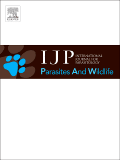
International Journal for Parasitology-Parasites and Wildlife
Scope & Guideline
Exploring the Interplay Between Wildlife and Parasitology
Introduction
Aims and Scopes
- Ecological and Evolutionary Dynamics of Parasitism:
Research in this area investigates the interactions between parasites and their wildlife hosts, focusing on how these relationships influence ecological dynamics and evolutionary processes. - Molecular Characterization and Phylogenetics:
The journal publishes studies utilizing advanced molecular techniques for the identification and characterization of parasites, contributing to the understanding of their phylogenetic relationships and evolutionary history. - Epidemiology and Public Health Implications:
Papers often address the epidemiological aspects of parasitic infections in wildlife, exploring their impact on public health, wildlife conservation, and disease transmission between wildlife and domestic animals. - Diversity and Taxonomy of Parasites:
The journal provides a platform for taxonomic studies that describe new species and assess the diversity of parasitic organisms across various wildlife species and habitats. - Conservation and Management Strategies:
Research that discusses the implications of parasitism on wildlife conservation and management practices is a key focus, with an emphasis on developing strategies to mitigate negative impacts on wildlife populations.
Trending and Emerging
- Environmental and Climate Change Effects:
Recent publications increasingly explore how environmental factors and climate change influence parasite dynamics, host susceptibility, and disease transmission, reflecting a growing recognition of the importance of these issues in parasitology. - Zoonotic Diseases and One Health Approach:
There is a marked increase in research focusing on zoonotic parasites and their implications for public health, aligning with the One Health framework that emphasizes the interconnectedness of human, animal, and environmental health. - Genomic and Metagenomic Approaches:
The use of genomic and metagenomic techniques is on the rise, allowing for comprehensive assessments of parasitic diversity and community structure, as well as insights into host-parasite interactions at a molecular level. - Parasite-Driven Behavioral Manipulation:
Emerging studies are investigating the effects of parasites on host behavior, particularly in wildlife, which has implications for understanding host-parasite co-evolution and ecological dynamics. - Conservation Parasitology:
A growing body of work is dedicated to understanding the role of parasites in wildlife conservation, including how parasites can affect endangered species and the strategies needed to manage these interactions effectively.
Declining or Waning
- Traditional Parasitology Techniques:
There has been a noticeable decline in studies relying solely on traditional parasitological methods, such as morphological identification, as researchers increasingly adopt molecular techniques that offer more precise identification and characterization. - Host-Specific Parasite Interactions:
Research specifically focused on host-specific interactions is becoming less common, possibly overshadowed by broader ecological and evolutionary studies that consider multi-host systems and their implications. - Case Studies of Individual Species:
There appears to be a waning interest in case studies that focus on individual parasite species or host species in isolation, with a trend towards more integrative studies that consider community dynamics and broader ecological contexts.
Similar Journals
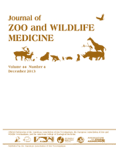
JOURNAL OF ZOO AND WILDLIFE MEDICINE
Enhancing animal welfare through impactful research.JOURNAL OF ZOO AND WILDLIFE MEDICINE, published by the American Association of Zoo Veterinarians, serves as a pivotal resource in the field of veterinary science, focusing specifically on the health and well-being of zoo and wildlife species. With an ISSN of 1042-7260 and an E-ISSN of 1937-2825, this journal is recognized for its significant contributions to animal science and has been categorized in the second quartile in both Animal Science and Zoology, as well as Veterinary disciplines, according to the latest rankings. It holds a respectable position within Scopus, being ranked #91 in General Veterinary and #290 in Animal Science and Zoology. While the journal operates on a subscription basis, its impactful research articles have been invaluable for clinicians, researchers, and students alike, providing crucial insights that advance wildlife conservation, veterinary practices, and animal health care from 1993 to the present. With a global reach and a targeted focus on both theoretical and practical applications, JOURNAL OF ZOO AND WILDLIFE MEDICINE is instrumental in fostering collaboration among professionals dedicated to the study and care of wild animal populations.

FOLIA PARASITOLOGICA
Illuminating the World of Parasites and Their Impact.FOLIA PARASITOLOGICA is a distinguished scholarly journal published in the Czech Republic, focusing on the field of parasitology. With a commitment to advancing knowledge in parasitology, the journal covers a wide array of topics including the biology and control of parasites, host-parasite interactions, and epidemiology. Having been in circulation since 1971 and currently converging its years of research until 2024, FOLIA PARASITOLOGICA has established itself as a vital resource for researchers, professionals, and students in immunology and microbiology, currently ranked in the Q3 category for Parasitology. Although it does not operate under an open-access model, the journal's relevance is underscored by its Scopus ranking, where it is positioned 47th out of 79 in the field, reflecting the high standards of research it publishes. By hosting a range of studies and reviews, FOLIA PARASITOLOGICA continues to contribute significantly to the scientific community, fostering advancements that enhance our understanding and management of parasitic diseases.

Journal of Fish and Wildlife Management
Innovating wildlife management for a sustainable tomorrow.The Journal of Fish and Wildlife Management, published by the U.S. Fish & Wildlife Service, serves as a vital resource for scholars, researchers, and professionals in the fields of Animal Science, Ecology, and Conservation Biology. With its ISSN 1944-687X, this esteemed journal has been disseminating critical research findings since 2010, contributing significantly to the understanding of fish and wildlife conservation practices and their ecological impacts. Despite its Q3 category rankings in various disciplines as of 2023, it provides a platform for innovative research that influences policy and management strategies for biodiversity conservation. The journal, although not open access, remains committed to advancing the scientific discourse surrounding wildlife management with articles that emphasize practical conservation efforts and ecological sustainability. Readers can expect a diverse range of articles that promote best practices in the management and conservation of fish and wildlife resources, furthering our collective mission of preserving ecological health and biodiversity for future generations.
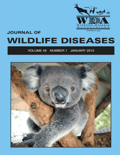
JOURNAL OF WILDLIFE DISEASES
Fostering collaboration to safeguard wildlife and ecosystems.JOURNAL OF WILDLIFE DISEASES, published by the WILDLIFE DISEASE ASSOCIATION, INC, is a premier, peer-reviewed journal dedicated to advancing the understanding of wildlife diseases and their implications for ecosystems and public health. Since its inception in 1970, this journal has served as a crucial platform for researchers and professionals within the fields of ecology and wildlife management, currently maintaining a credible Q2 ranking in Ecology and a Q3 ranking in Ecology, Evolution, Behavior and Systematics as of 2023. With an ISSN of 0090-3558 and an E-ISSN of 1943-3700, the journal encompasses a wide range of topics, from disease dynamics to the conservation of wildlife populations. This journal is recognized for its valuable contributions to the ecological and environmental sciences, supporting evidence-based approaches to wildlife management. While it does not offer open access, the JOURNAL OF WILDLIFE DISEASES continues to impact the scientific community and policy-making through its rigorous publications. As such, it remains an essential resource for those committed to understanding and addressing the complex challenges of wildlife health.
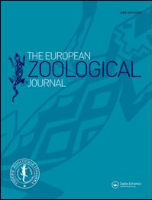
European Zoological Journal
Championing Open Access to Zoological KnowledgeEuropean Zoological Journal, published by Taylor & Francis Ltd, is an esteemed open-access publication dedicated to advancing the exciting field of zoology. Since its inception in 2017, this journal has progressively established itself as a vital resource for researchers, professionals, and students alike. With its Q2 ranking in Animal Science and Zoology as of 2023, the journal ranks in the 69th percentile among its peers, showcasing its influence and contribution to the discipline. The journal’s broad scope covers a wide range of topics within zoology, aiming to foster an understanding of animal biology and conservation efforts. As an open-access journal, it not only enhances the dissemination of knowledge but also encourages collaborative research across global communities. Situated in the United Kingdom, the European Zoological Journal invites submissions that contribute to the evolving discourse in animal sciences, and endeavors to support the scientific community in addressing pressing ecological challenges.
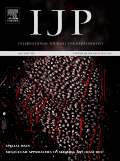
INTERNATIONAL JOURNAL FOR PARASITOLOGY
Advancing the Frontiers of Parasitology ResearchInternational Journal for Parasitology, published by Elsevier Sci Ltd, stands as a premier platform for disseminating groundbreaking research in the fields of parasitology and infectious diseases. With an impressive impact factor represented by its Q1 quartile rankings in both Infectious Diseases and Parasitology for 2023, this journal commands significant attention within the scientific community. Operating since 1971, it has profoundly contributed to the understanding of parasitic infections and their implications for human health, occupying a distinguished position ranked #7 out of 79 in Parasitology and #64 out of 344 in Infectious Diseases according to Scopus metrics. Although the journal currently does not offer open access options, it ensures rigorous peer review and unparalleled academic integrity, providing researchers, professionals, and students with critical insights necessary for advancing knowledge and fostering innovations in parasitology. Together with its rich historical foundation and commitment to excellence, the journal is indispensable for anyone delving into the complexities of parasites and their impact on both host and ecosystem.

CALIFORNIA FISH AND GAME
Pioneering Research in Animal and Aquatic SciencesCalifornia Fish and Game is a prominent journal dedicated to the fields of Animal Science and Aquatic Science, published by the California Fish and Game Editor. With its roots extending back to 1979, the journal has served as a vital platform for disseminating research focused on the wildlife and aquatic ecosystems of California and beyond. Recognized within the Q4 quartile for both Animal Science and Zoology and Aquatic Science, it provides critical insights and scholarly contributions, despite its comparative rankings within the respective categories. The journal, with an ISSN of 0008-1078 and an E-ISSN of 2331-0405, offers an invaluable resource for researchers, professionals, and students alike, looking to deepen their understanding of California's rich biodiversity and ecological challenges. For those interested in open access options, further details can be reviewed through the journal's platform. By fostering a community of inquiry, California Fish and Game plays an essential role in advancing knowledge and conservation efforts in the fields of interest.

SYSTEMATIC PARASITOLOGY
Connecting global researchers in the study of parasitology.SYSTEMATIC PARASITOLOGY, a premier academic journal published by Springer, serves as a vital resource in the field of parasitology. Since its inception in 1979, this journal has committed itself to advancing the understanding of parasitic organisms and their interactions with hosts, thus playing a significant role in both basic and applied research. With an impactful contribution to the scientific community—evidenced by its Scopus ranking and its position in the third quartile (Q3) within the Parasitology category—the journal provides a platform for high-quality, peer-reviewed research that spans a variety of topics from molecular biology to ecology. Although not currently open access, SYSTEMATIC PARASITOLOGY remains essential for researchers, professionals, and students who seek to stay at the forefront of parasitological studies and contribute to ongoing developments in the domain. Published in the Netherlands, it continues to attract a diverse international readership, fostering a collaborative scientific environment.
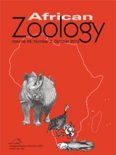
AFRICAN ZOOLOGY
Bridging Science and Conservation in AfricaAFRICAN ZOOLOGY, published by Taylor & Francis Ltd, stands as a significant journal in the realm of Animal Science and Zoology, with a proud history dating back to 1996 and slated to continue until 2024. With an ISSN of 1562-7020 and E-ISSN 2224-073X, this journal provides a reputable platform for researchers and practitioners dedicated to the study of animal biology across the African continent. It has been recognized for its quality scholarship, evidenced by its Q3 categorization in the 2023 Scopus quartile rankings and an impressive rank of #182 out of 490 within its field. As an open-access journal, it facilitates the dissemination of vital research findings and promotes broader accessibility, catering to a diverse audience of professionals, scholars, and students alike. The journal aims to enhance our understanding of wildlife, conservation, and ecosystem dynamics in Africa, fostering collaborations that address critical ecological challenges. For researchers and enthusiasts keen on contributing to and staying informed about advancements in zoological science, AFRICAN ZOOLOGY is an essential resource that enriches the global discourse on biodiversity and conservation efforts.

Human-Wildlife Interactions
Connecting Ecology and Conservation Through Research and Dialogue.Human-Wildlife Interactions, published by the JACK H BERRYMAN INST, is a leading open-access journal dedicated to the critical study and understanding of the complex relationships between humans and wildlife. Launched in 2007, the journal has become a pivotal platform for researchers, practitioners, and students in the fields of ecology and conservation. It is based in the heart of ecological research at Utah State University, bringing together diverse perspectives that illuminate both the challenges and solutions associated with wildlife interactions. With an impact factor reflected in its respectable Q3 ranking in Ecology and Nature and Landscape Conservation, it demonstrates a solid contribution to these scientific domains. Researchers exploring innovative conservation strategies, wildlife management practices, and the socio-economic impacts of wildlife are encouraged to submit their studies, enhancing the journal's role in fostering dialogue and advancing knowledge in this vital area of environmental science. Accessible to a global audience, Human-Wildlife Interactions continues to promote scholarly discourse in a way that supports the sustainable coexistence of people and wildlife in our shared environments.